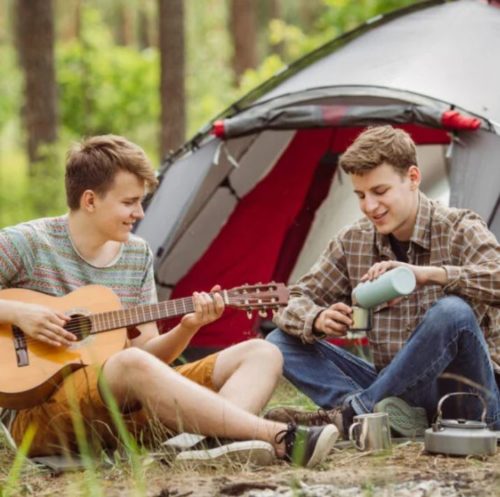
Camping Season – Creating a Low Impact Camping Experience
Camping is a fun, seasonal, summer activity which takes a little mindfulness to do without impacting the environment. This blog will help you navigate campsite recycling systems and will share some ways you can make your next camping experience have a low impact on the environment and hopefully have a high impact on you.
Recycling at Campsites
Generally, when you are going camping, you are entering a district that has a different set of recycling rules than those you follow at home. This means that step #1 is to obtain the campground waste management rules before you even pack for your trip. This will help you bring sustainably packaged food, waste receptacles suitable to the location, food storage containers, eating utensils and cleaners that are suitable to the setting. Additionally, it is important to check out the ‘garbage station’ upon check in to make sure you know what is and is not recyclable.
Waste Free Camping Ideas
It is easy to pick up food and items for camping that are ‘convenience packaged.’ This creates garbage and unrecyclable material that you otherwise wouldn’t purchase or buy. However, there are some things that you could buy, do or use alternatively that may help to curb your waste generation while camping. Here is a small list of things that may help you to get closer to nature without negatively impacting the wilderness you aim to enjoy.
1. Beeswax Wraps
Since you typically pack light when you go camping, you likely won’t be bringing along many containers for left over food. To make up for this, you will likely bring a roll of plastic wrap or zip lock bags to repackage food. This just creates more garbage and is not reusable. Alternatively, try beeswax wraps! These are made of reusable material that is coated in beeswax. They are easy to clean, store and use, AND make a great alternative to plastic wrap! Vegan? They make vegan friendly ones too! Check your local eco-store or order online. You won’t regret it – they are awesome!
2. Aluminum Foil Alternative
Instead of bringing along a roll of aluminum foil to cook things in the fire, consider bringing cast iron or fire safe pan to do your cooking. Use oil on your pans instead of lining with aluminum foil.
3. Reusable Plates & Cutlery
A lot of people choose to bring paper plates and plastic cutlery when camping. The problem with this is that there aren’t usually organics recycling at campgrounds, and therefore all paper plates and even ‘compostable’ cutlery is considered garbage. However, if you are using your paper plates and disposable bamboo utensils as part of your fire starter, you are more eco-friendly than if you had used plastic. With that said, never put plastic utensils, or plastic plates, into your fire. The most eco-friendly plan is to bring regular utensils and plates.
4. Leave no trace
This is a big one. So much garbage, recycling and food waste is generated while camping. I have seen people leave their campsites littered with empty beer cans, plastic bottles or garbage bags. Be responsible for the waste you generate. If there are no garbage cans or recycling bins around, make sure you bring bags or bins to bring it home. This is a simple act that respects nature and others.
When camping, you generally do a few trail/nature walks or beach visits. If you see garbage around, pick it up and throw it out (or recycle it). It takes minimal effort, and you can clean up the environment for others to enjoy. You can’t stop people from littering, but you can help curb the impact by doing your part.
5. Bring it home if its not recyclable
If you notice an item is not accepted in the recycling program at the campsite, you can bring that item home to be recycled. For example, many areas don’t accept stretchy plastic wrap or bags in their recycling system, but Niagara does. Bring those plastic bags home and simply recycle them in your home recycling/garbage program. It doesn’t take much effort and it is one way to do your part for low impact camping.
These are simple reminders so that we can enjoy the great outdoors without negatively impacting it. All of them can be carried on a home too.
Are there any tips and tricks you have come up with? Let us know, comment below.
